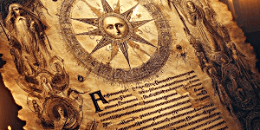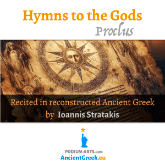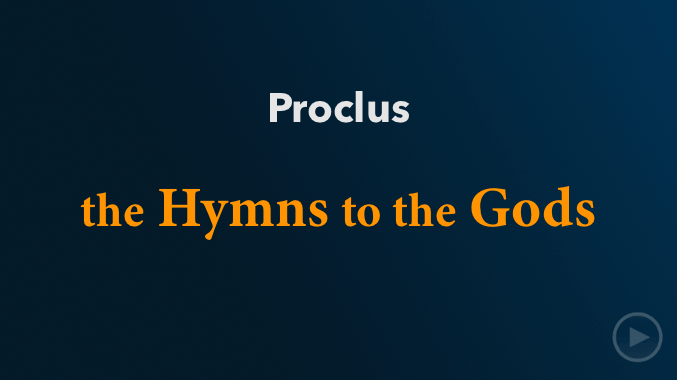• Hymns to the Gods •
• Proclus •

Duration: 21 min 25"
Unabridged
Recorded: 2024
Price : $/€ 20 (audiobook), 35 (videobook)
About Proclus' Hymns to various Gods
In his poetic homage to the celestial luminary, Proclus venerates the sun as the epitome of mental fire and the sovereign of light. He portrays it as the genesis of life's harmony and providential care, in perpetual celestial dance as a cosmic regulator of time and seasons, dispersing darkness with its radiant beams. The sun's benevolence in dispelling illness and nurturing health, a blessing and protection against malevolent forces.
Turning his reverence to the Muses, Proclus extols the nine daughters of Zeus as embodiments of wisdom, guiding souls through life's tribulations toward spiritual enlightenment. He beseeches their divine influence to transcend earthly desires, seeking their transformative power to refine the mind and inspire the pursuit of sacred knowledge.
The hymn dedicated to Aphrodite celebrates the goddess of love and beauty, a majestic source of divine influence and progenitor of immortal loves. A praise of her multifaceted role, from inspiring spiritual ascent to fostering mortal life through love and procreation. Proclus invokes Aphrodite's protection and guidance, entreating her to shield mortals from earthly desires and ignite their souls with divine passion.
The hymn dedicated to the common gods serves as a fervent plea for spiritual enlightenment, invoking divine guidance to transcend mortal limitations and attain sacred knowledge. Proclus expresses a profound desire for purification and protection from ignorance and suffering, beseeching the gods to lead souls towards wisdom.
In his reverential invocation to Hecate, Ianus, and Zeus, Proclus seeks guidance, purification, and protection. He earnestly pleads for divine assistance in navigating life's challenges and achieving spiritual growth, reflecting themes of devotion and the quest for enlightenment.
In honoring Lycian Aphrodite, Proclus attributes the construction of her temple to divine inspiration, praising her guidance in virtuous living and beseeching her to cleanse the soul and shield from destructive forces.
Finally, Proclus extols Athena's wisdom and courage, invoking her divine favor to illuminate the mind and protect from misfortune, showcasing the solemn devotion typical of ancient hymns to the gods.
You can follow the Greek text a/o a translation in English, online at the Archive.org website.
about Proclus
Proclus (Gr.: Πρόκλος) (412-485 AD) was a prominent Neoplatonist philosopher whose life and works greatly influenced the development of late ancient and medieval philosophy. Born in Constantinople, Proclus studied under notable philosophers such as Syrianus and Plutarch of Athens, immersing himself in the teachings of Plato and Aristotle.
His most significant contributions lie in his philosophical synthesis and systematization of Neoplatonic thought. Proclus wrote extensively on a wide range of topics, including metaphysics, theology, epistemology, and cosmology. His magnum opus, "The Elements of Theology," offers a comprehensive exposition of Neoplatonic metaphysics and the nature of the divine.
Proclus also played a crucial role in preserving and interpreting the works of earlier philosophers, particularly Plato. His commentaries on Plato's dialogues are highly regarded for their insights into Platonic thought and their elucidation of complex metaphysical concepts.
Furthermore, Proclus made significant contributions to theurgy, a spiritual practice aimed at achieving union with the divine. His emphasis on the importance of religious ritual and mystical experience influenced later esoteric traditions.
Proclus's works had a lasting impact on subsequent philosophical movements, including medieval Scholasticism and Renaissance Neoplatonism. His synthesis of Platonic and Aristotelian ideas continues to inspire scholars and philosophers interested in metaphysics, theology, and the nature of reality.
More info about Proclus' life and work can be found at the Stanford Encyclopedia of Philosophy website.
About the audio~videobook
 The recording contains the surviving eight hymns to the gods by Proclus in Ancient Greek. The videobook shows the highlighted Greek text simultaneously with the reading and contains a small number of additional fragments.
After purchase you will be able to download the relevant file(s), containing the work in mp3 format.
The recording contains the surviving eight hymns to the gods by Proclus in Ancient Greek. The videobook shows the highlighted Greek text simultaneously with the reading and contains a small number of additional fragments.
After purchase you will be able to download the relevant file(s), containing the work in mp3 format.
The videobook comes with (optional) captions in English. Other languages on request.
You can listen to the beginning of Proclus' “Hymn to the Sun”, an audio sample of the present audiobook. Please, click on the play-button bellow and, if you wish, follow the Ancient Greek text lower on the page, or alternatively watch the video, which is provided with a quick translation in English. Thank you!
ΕΙΣ ΗΛΙΟΝ
«Κλῦθι, πυρὸς νοεροῦ βασιλεῦ, χρυσήνιε Τιτάν,
κλῦθι, φάους ταμία, ζωαρκέος, ὦ ἄνα, πηγῆς
αὐτὸς ἔχων κληῖδα καὶ ὑλαίοις ἐνὶ κόσμοις
ὑψόθεν ἁρμονίης ῥύμα πλούσιον ἐξοχετεύων.
κέκλυθι· μεσσατίην γὰρ ἐὼν ὑπὲρ αἰθέρος ἕδρην
καὶ κόσμου κραδιαῖον ἔχων ἐριφεγγέα κύκλον
πάντα τεῆς ἔπλησας ἐγερσινόοιο προνοίης.
ζωσάμενοι δὲ πλάνητες ἀειθαλέας σέο πυρσοὺς
αἰὲν ὑπ᾽ ἀλλήκτοισι καὶ ἀκαμάτοισι χορείαις
ζῳογόνους πέμπουσιν ἐπιχθονίοις ῥαθάμιγγας. »
